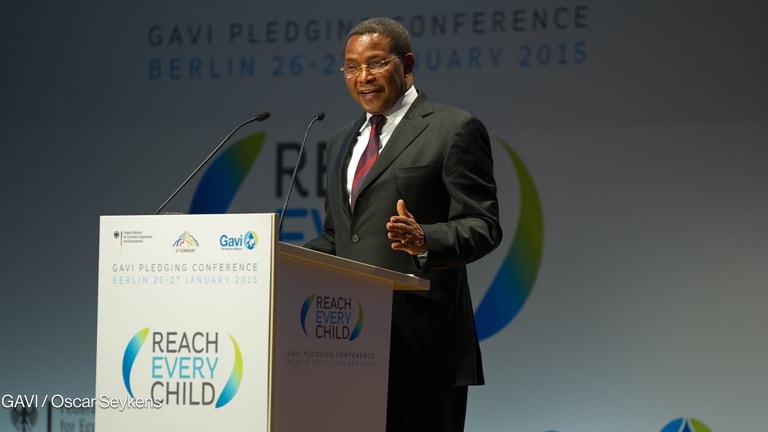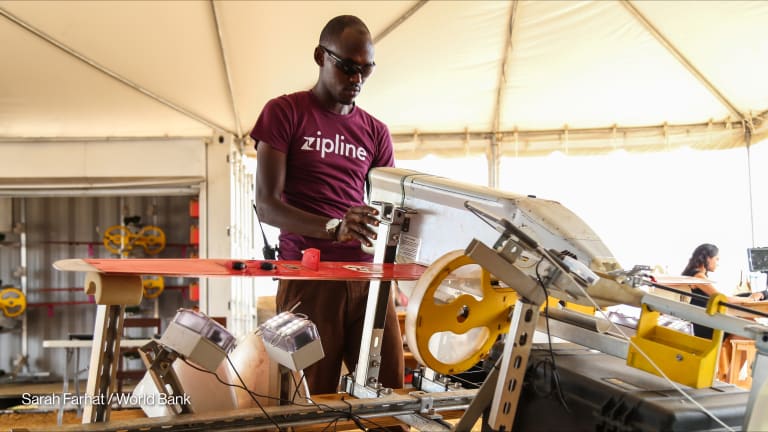Innovation at Gavi: 'The status quo will not suffice'
Moz Siddiqui, manager of strategic innovation and partnerships at Gavi, discusses how the vaccine alliance works with technology companies in the Bay Area and beyond to improve vaccine delivery.
SAN FRANCISCO — When Gavi, the Vaccine Alliance, convened Silicon Valley leaders at a lunch in the San Francisco Bay Area almost a year ago, the discussion centered on how to scale up private sector innovations so that vaccine deliveries can meet global health priorities while also benefiting the companies delivering the care. “If we are to succeed we will need your help,” wrote Seth Berkley, CEO of Gavi, in the email invitation. “As technology leaders, investors, and entrepreneurs, we believe that the solutions to many of these challenges are in many ways aligned with your own goals and are therefore asking for your input.” The event points to a key element of Gavi’s innovation strategy: engaging with technology companies in the Bay Area and beyond to improve vaccine delivery. Moz Siddiqui, senior manager of strategic innovation and partnerships at Gavi, spoke about the strategy in an interview with Devex. He explained how innovation can accelerate progress in vaccinating the hardest to reach children, as Gavi works to vaccinate 300 million more children by 2020. “Up to now, we have immunized 700 million children, and by 2020 we want to reach another 300 million children, so the alliance will have immunized a billion children,” he said. “How are we going to get to the last 20 percent? We know the solutions we have aren’t quite there. And we know that we need to work differently. The status quo will not suffice.” Gavi’s inquiry stands out among the many requests for partnership that flood Silicon Valley, Siddiqui said. He called Gavi a scaling platform, since it purchases vaccines for 60 percent of the world’s children, and works with countries to build systems in order to deliver those vaccines. “Gavi is the neutral partner representing the collective interests of all those vested within the vaccine ecosystem and aligning the incentives,” Siddiqui said, who is part of Gavi’s Resource Mobilisation and Private Sector Partnerships team. Rather than try and come up with new solutions, Gavi looks at existing innovations and asks how to apply those technologies to the Gavi context. As part of this approach, the organization launched INFUSE, an accelerator that aims to support “innovation for uptake, scale, and equity in immunization.” That has resulted in partnerships with organizations such as Nexleaf Analytics, which is developing an analytics framework to share data with governments that want to make more evidence-based decisions on vaccine delivery. “The biggest question I have is adaptability,” Siddiqui said. “We’re not saying whatever works for company X is going to work in country Y. But it’s looking at those approaches, and figuring out how that works in the context and problem we’re trying to solve for. Our engagement is around: How do we look at those solutions and adapt them to a Gavi context?” The drone startup Zipline also partnered with Gavi via the INFUSE program. Gavi helped to bring Zipline, the United Parcel Service, and the Rwandan government together to develop the first national drone delivery system. While the Rwanda drone network has primarily focused on carrying blood supplies, Gavi has worked with Zipline to explore how drones could deliver vaccines at a lower cost and faster rate than motorcycles. “Government ownership is the biggest driving factor for scale,” Siddiqui said. “You have to look at whether the government has really bought into this, and how can a mechanism like Gavi drive that forward.” “Government ownership is the biggest driving factor for scale.” --— Moz Siddiqui, manager of strategic innovation and partnerships, Gavi For example, Gavi is working with partners such as Zenysis, a Silicon Valley-based company that provides data analytics for developing countries. Gavi has helped Zenysis identify countries where there is a need for its product, and Zenysis has worked with those governments to leverage data for more targeted and cost-effective interventions — for example in Ethiopia, where Zenysis helped the government determine how to increase coverage of a measles vaccination. Looking ahead, Siddiqui said he wants to identify more partnerships that can make sense of the huge amount of data that might help improve vaccine delivery. In the meantime, Gavi faces challenges in operationalizing its innovation strategy: “Internally, It is ensuring that an organization as diverse as Gavi, which includes the alliance partners, agree on the definition and use of innovation,” Siddiqui said. Externally, speaking to partners and potential investors, the challenge is keeping stakeholders engaged in the discussions and demonstrating that there is a real need for new approaches: “Building that business case often requires champions who see the potential,” he said, explaining that events like the Silicon Valley roundtable help Gavi identify those partners. If Gavi finds solutions that can address its problems in a systemic way, then it can make the case to donors to add a couple of dollars on top of that, he added. “There is an opportunity to support health care systems as a whole rather than just immunization,” he added. “We’re trying to demonstrate to our corporate partners that there is a market. But we also have to do this work with the buy-in of the government, ensuring it is cost effective and sustainable, and that there is trust. Gavi’s role is to mitigate risks on both sides.” The company spends a significant amount of funding on systems strengthening, such as supply chain improvements, which can improve immunization outcomes and also incentivize private sector participation, he said. Update, Oct. 29, 2018: This article has been updated to clarify Siddiqui’s title as senior manager, strategic innovation and partnerships. To hear more about partnerships for health, join Devex for the livestream of Prescription for Progress on Oct 30.
SAN FRANCISCO — When Gavi, the Vaccine Alliance, convened Silicon Valley leaders at a lunch in the San Francisco Bay Area almost a year ago, the discussion centered on how to scale up private sector innovations so that vaccine deliveries can meet global health priorities while also benefiting the companies delivering the care.
“If we are to succeed we will need your help,” wrote Seth Berkley, CEO of Gavi, in the email invitation. “As technology leaders, investors, and entrepreneurs, we believe that the solutions to many of these challenges are in many ways aligned with your own goals and are therefore asking for your input.”
The event points to a key element of Gavi’s innovation strategy: engaging with technology companies in the Bay Area and beyond to improve vaccine delivery.
This story is forDevex Promembers
Unlock this story now with a 15-day free trial of Devex Pro.
With a Devex Pro subscription you'll get access to deeper analysis and exclusive insights from our reporters and analysts.
Start my free trialRequest a group subscription Printing articles to share with others is a breach of our terms and conditions and copyright policy. Please use the sharing options on the left side of the article. Devex Pro members may share up to 10 articles per month using the Pro share tool ( ).
Catherine Cheney is the Senior Editor for Special Coverage at Devex. She leads the editorial vision of Devex’s news events and editorial coverage of key moments on the global development calendar. Catherine joined Devex as a reporter, focusing on technology and innovation in making progress on the Sustainable Development Goals. Prior to joining Devex, Catherine earned her bachelor’s and master’s degrees from Yale University, and worked as a web producer for POLITICO, a reporter for World Politics Review, and special projects editor at NationSwell. She has reported domestically and internationally for outlets including The Atlantic and the Washington Post. Catherine also works for the Solutions Journalism Network, a non profit organization that supports journalists and news organizations to report on responses to problems.








